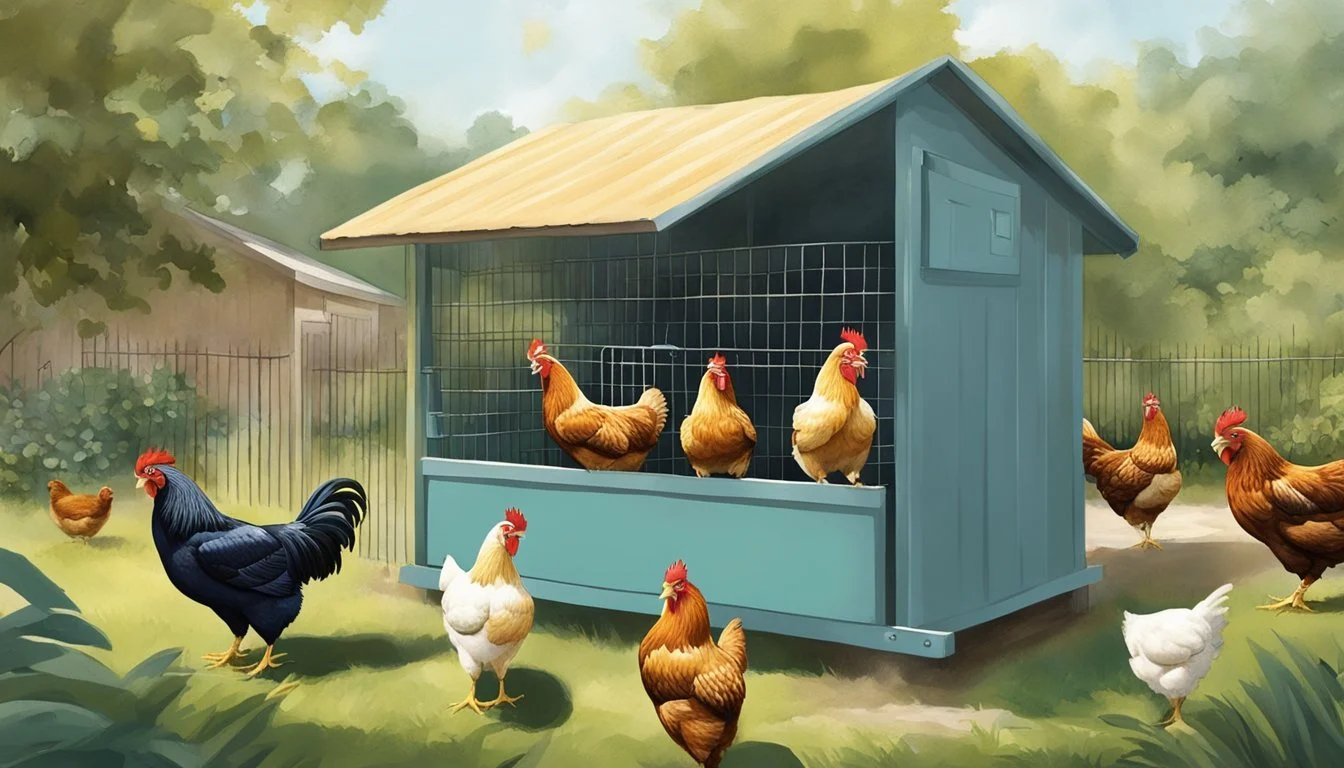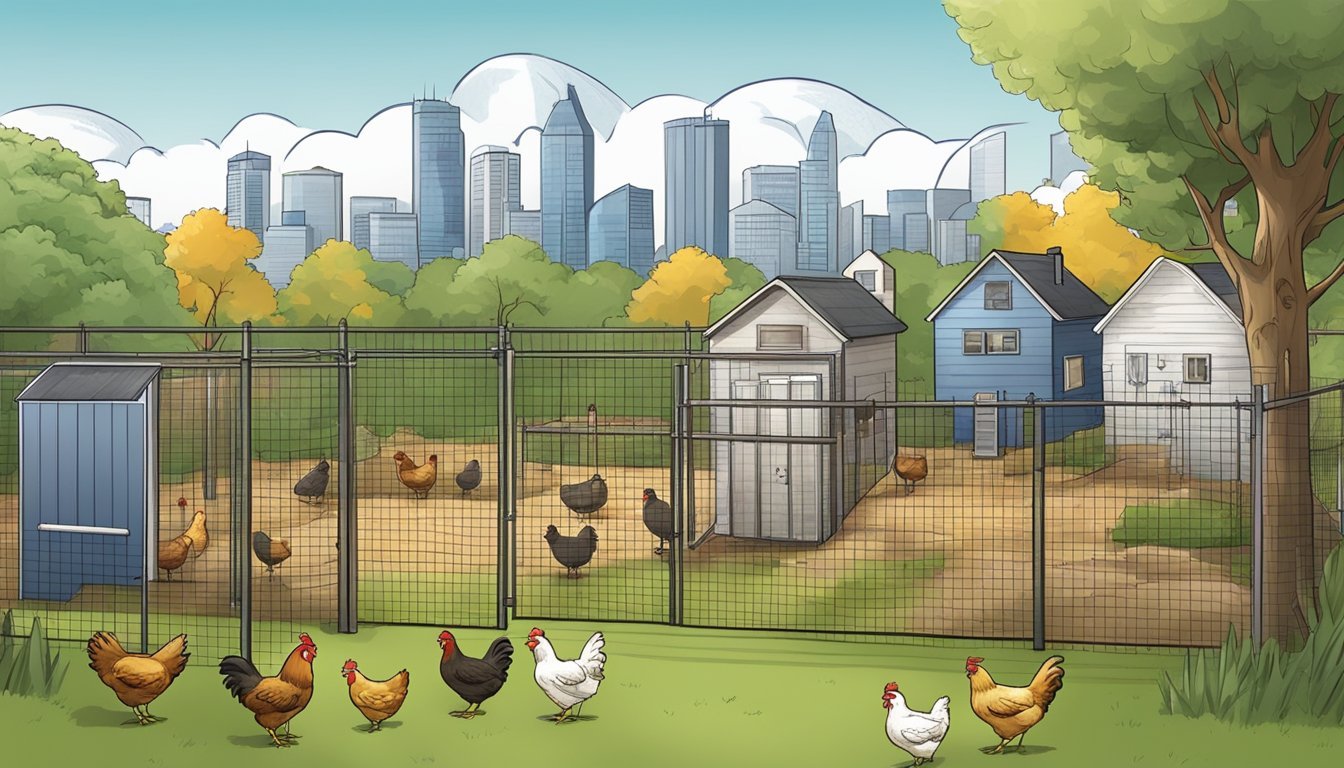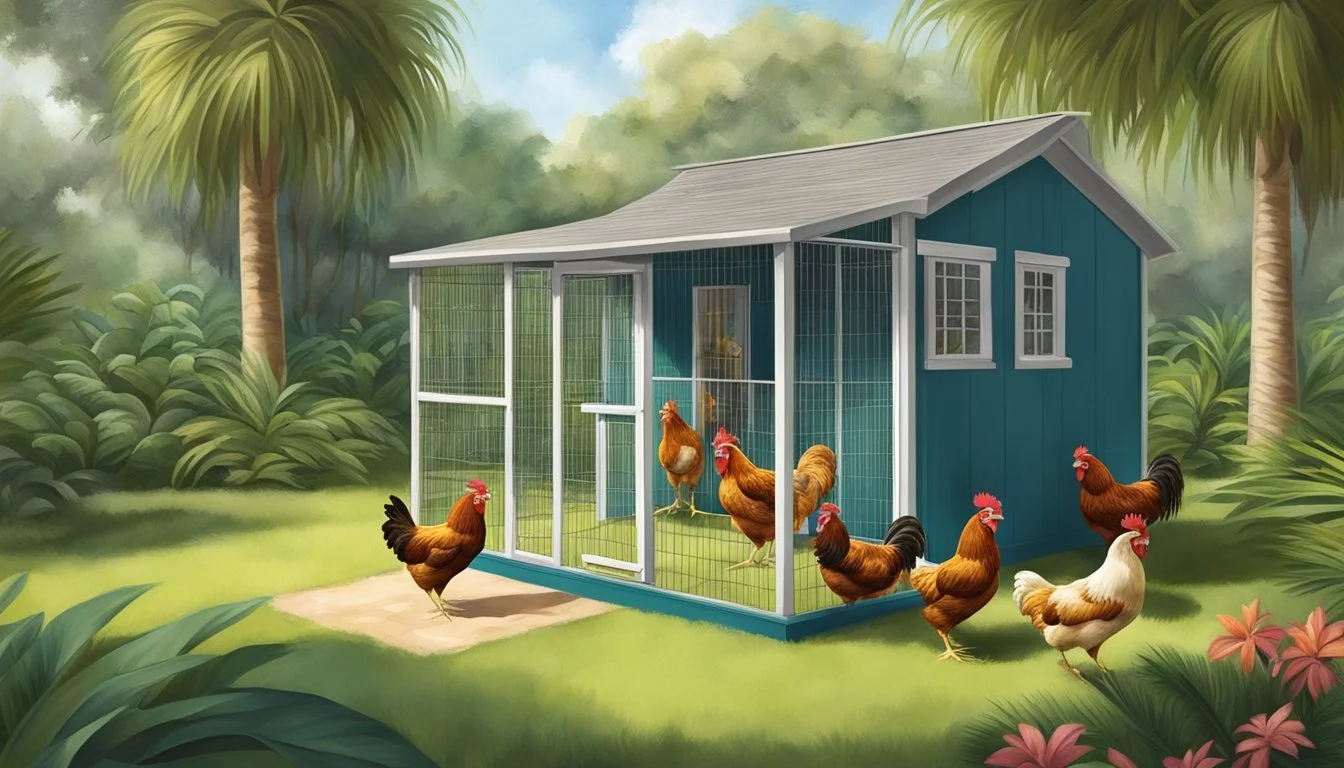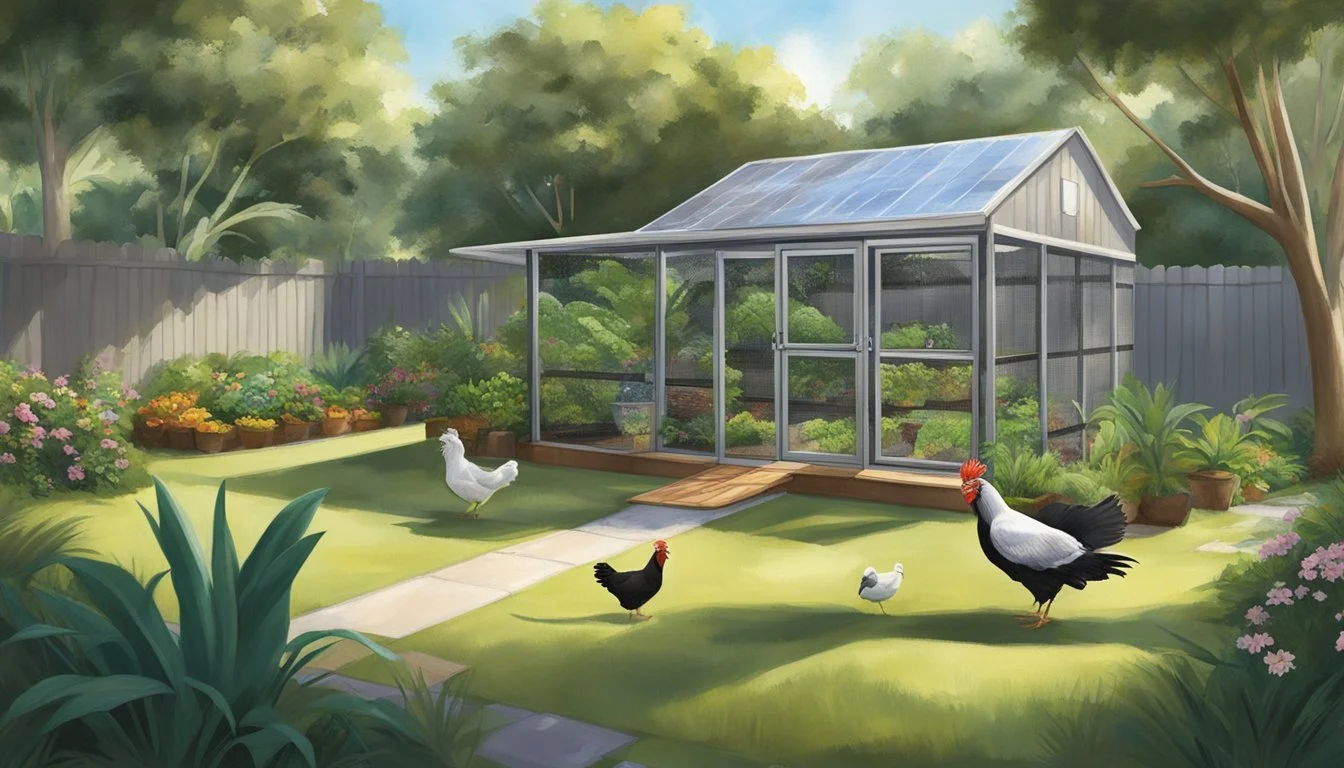Keeping Backyard Chickens in St. Petersburg, FL
Keeping Backyard Chickens in St. Petersburg, FL
In St. Petersburg, Florida, there has been an increasing interest in sustainable living and urban agriculture, prompting many residents to consider keeping backyard chickens. This coastal city has specific ordinances to manage urban livestock within its limits, which are designed to protect both the well-being of the animals and the community. Prospective chicken keepers must navigate these regulations, ensuring their coop designs and maintenance practices meet health and safety standards, as well as adhering to rules regarding the placement of chicken enclosures.
Keeping backyard chickens comes with responsibilities, including being aware of and compliant with local laws that dictate how many chickens one can keep and the restrictions on selling eggs and meat. In St. Petersburg, for example, the local ordinances require that coops be placed at least 100 feet away from any residence, unless explicit permission is given by a homeowner. This rule is part of a broader framework to maintain harmony between urban farming enthusiasts and non-farming residents, addressing concerns such as noise, odor, and property values.
The city's regulations are modern responses to an age-old practice, marrying the growing trend of local food movements with the maintenance of city aesthetics and neighborly peace. As families in St. Petersburg look toward self-sufficiency and the pleasures of farm-fresh eggs, it is crucial they remain informed about the most current chicken laws, which can be obtained through the city’s organizations or by contacting local authorities. It is through this careful balance of personal interest and community standards that urban chicken keeping continues to thrive in this sunny Floridian city.
Understanding Local Ordinances
Residents of St. Petersburg, Florida considering the addition of chickens to their backyards must adhere to local ordinances that govern the keeping of such poultry. The city has established specific regulations within the Municipal Code to ensure harmony in residential areas and to address common concerns such as noise, nuisance, hygiene, and overall community welfare.
Permit Requirement and Zoning A permit is generally required for residents to legally keep chickens in their backyard. The permit assures that chicken keepers comply with health and safety rules. It is vital to consult the most recent zoning laws as they may influence the number of chickens allowed and the location of coops in relation to property lines or neighboring dwellings.
Restrictions and Regulations Key restrictions include:
Distance: Coops must be situated at least 100 feet from any residence unless explicit written consent is obtained from the owner of the residence in question.
Noise Control: Roosters are typically not allowed in residential areas due to their potential to cause noise nuisance. This rule helps maintain quiet neighborhoods.
Nuisance Mitigation: There are also regulations focused on preventing chickens from becoming a nuisance or health hazard.
Enforcement The enforcement of these ordinances falls to local authorities in St. Petersburg and Pinellas County. Homeowner Associations may impose additional requirements or restrictions that supersede local ordinances.
Residents must contact the appropriate city department to obtain a permit and ensure compliance with all local ordinances. Keeping chickens without adhering to these ordinances could result in fines or the removal of the chickens.
For the latest guidelines and contacts, refer to the St. Petersburg City Municipal Code or local government authorities to ensure correct and lawful backyard poultry keeping.
Choosing the Right Breed
When keeping backyard chickens in St. Petersburg, FL, breed choice is pivotal. One should consider the local climate, the breed's temperament, and egg laying capabilities to ensure a harmonious and productive backyard flock.
Climate Considerations
St. Petersburg, FL experiences a humid subtropical climate with hot, wet summers and mild, drier winters. Breeds that are well-suited to this environment include:
Leghorns: They are heat-tolerant and lay a high number of eggs.
Rhode Island Reds: These hens are adaptable to heat and are also reliable egg producers.
Temperament and Behavior
The backyard flock's temperament is important for both the chickens' well-being and the owner's ease of management. Consider these breeds for their generally good nature:
Plymouth Rocks: Known for being friendly and docile, making them excellent pets.
Orpingtons: These birds are calm and make ideal candidates for suburban backyards.
Egg Production Expectations
Egg production is often a primary reason for keeping hens. Breeds known for their egg laying include:
Australorps: Capable of laying around 250 eggs per year.
Sussex: They can provide about 200 to 250 eggs annually.
Remember, roosters are not allowed in the city limits to minimize noise complaints, so when selecting breeds, focus on hens that can thrive in the local climate and meet your egg production goals.
Designing Your Chicken Coop
When designing a chicken coop in St. Petersburg, FL, residents must consider local regulations along with the health and safety of the chickens. Key elements include managing space, ensuring protection, providing ventilation, maintaining cleanliness, and facilitating egg collection.
Size and Space Requirements
The coop must provide adequate space for the chickens to live comfortably. St. Petersburg regulations allow up to 10 chickens, but they must have enough room to roam, rest, and engage in natural behaviors. An ideal space allocation would be at least 3 square feet per chicken inside the coop and about 8-10 square feet per chicken in an outdoor run.
Protection from Predators
Chickens are vulnerable to various predators, including raccoons, hawks, and neighborhood dogs. Coops must be fortified with sturdy materials to prevent entry. Features may include:
Solid walls: Prevent animals from reaching in
Secure latches: Keep doors tight against clever predators
Screened windows: Shield openings with hardware cloth or similar heavy-duty screening
Ensuring Proper Ventilation
A well-ventilated coop is vital to keep chickens healthy and to reduce moisture, ammonia, and dust levels. Ventilation should:
Control airflow: Use vents or windows placed high in the coop
Be adjustable: Allow for changes in weather conditions
Stay predator-proof: Screened vents to block entry
Easy-to-Clean Features
Regular cleaning is essential to prevent disease and odor build-up. To facilitate this:
A removable droppings tray under roosts eases waste disposal
Smooth, non-porous surfaces allow for easier scrubbing
Ample doors and openings enable access to all areas inside the coop
Accessibility for Egg Collection
Egg collection needs to be straightforward to minimize stress for both chickens and their owners. Coops should have:
Nesting boxes with exterior access: Allows egg retrieval without entering the run or coop
Locations near the coop entrance: Streamlines collecting tasks and reduces disturbance to hens
Feeding and Watering
Proper nutrition and hydration are vital for the health of backyard chickens. It's crucial to understand their specific dietary requirements, maintain regular feeding schedules, and ensure a consistent and clean water supply.
Nutritional Needs
Chickens require a balanced diet composed of carbohydrates, proteins, fats, vitamins, and minerals. These nutritional needs vary depending on the chicken's age, breed, and purpose (egg-laying vs. meat production). For instance, growers should feed layers a diet with 16-18% protein, whereas meat birds require closer to 20-22% protein.
Starter Feed: High protein content (around 20-24%) for chicks up to 6 weeks old.
Grower Feed: Slightly lower protein content (around 16-18%) for chickens from 6 to 20 weeks old.
Layer Feed: Balanced to support egg production with adequate calcium and around 16% protein for hens over 20 weeks old.
Calcium supplements, such as oyster shells, can be provided separately to laying hens to enhance eggshell strength.
Feeding Schedules
Consistency is key in feeding backyard chickens. They should be fed once or twice a day, maintaining a routine that chickens can rely on.
Age-specific feeding guidelines:
Chicks (0-6 weeks): Feed starter food ad libitum as they require constant access to grow properly.
Pullets (6-20 weeks): Transition to grower food and begin to regulate the feeding to twice daily.
Adult chickens (20+ weeks): Move to layer ration and continue with the twice-daily schedule or free-choice feeding.
Water Supply Systems
Chickens must have access to clean water at all times. The water supply system needs to be reliable and easy for the chickens to access, protecting against contamination and freezing in colder climates.
Types of water systems:
Nipple Systems: Minimizes water spillage and keeps the water clean.
Cup Systems: Allows chickens to drink from a trough, which can also be fitted with automatic refill mechanisms.
Traditional Waterers: Works well but requires regular cleaning to prevent algae growth and contamination.
Water should be refreshed daily, and the system should be checked for leaks or blockages regularly. In hot weather, checking the water supply becomes even more critical to prevent dehydration.
Maintaining Health and Hygiene
Maintaining health and hygiene is essential for the well-being of backyard chickens in St. Petersburg, FL. Appropriate cleaning routines, proper waste management, and diligent disease prevention measures are crucial to a healthy flock.
Regular Cleaning Routines
Regular cleaning is vital for the health of backyard chickens. Owners should clean the coop daily to remove droppings and refresh the nesting material. Weekly deep cleaning is also essential, including scrubbing and disinfecting waterers and feeders. A clean coop minimizes the risk of pests and diseases.
Managing Waste and Odor
Effective waste management is necessary to control odors and maintain a hygienic environment. Manure should be collected regularly and can be used for composting, which benefits garden health. To reduce odor, owners can:
Use absorbent materials like straw or wood shavings.
Ensure proper ventilation in the coop.
Implement regular composting techniques to manage manure.
Disease Prevention
Preventing disease involves several proactive steps:
Quarantine new birds before introducing them to the flock to prevent the spread of illness.
Vaccinate chickens, if recommended by a veterinarian, to protect against common poultry diseases.
Maintain clean water and food sources to avoid contamination.
Regularly inspect chickens for signs of illness and consult a veterinarian immediately if symptoms are detected.
Understanding Legal Restrictions
In St. Petersburg, Florida, residents interested in keeping backyard chickens need to be aware of several key legal restrictions that govern noise, property boundaries, flock size, and the processing of chickens.
Noise Restrictions
Residents must ensure that their chickens do not create excessive noise which could disturb neighbors. Roosters, which are notably louder than hens, are prohibited within the city to maintain a noise-friendly environment.
Setback Rules from Property Lines
Setbacks are essential to consider while keeping backyard chickens. The local ordinance specifies that coops or enclosures must be situated at a minimum distance from neighboring property lines to avoid any nuisances.
Limitations on Flock Size
St. Petersburg's city regulations stipulate a maximum limit on the number of chickens one can keep. This limit is set to ensure that the chickens can be maintained without causing sanitary or space-related issues within urban environments.
Restrictions on Slaughtering
The city ordinance clearly states that slaughtering of chickens within city limits is regulated. Residents must follow these restrictions closely to ensure compliance with local ordinances regarding the processing of poultry on residential properties.
Living with Neighbors
When keeping backyard chickens in St Petersburg, FL, residents must consider their impact on their neighbors, particularly regarding noise and maintaining peaceable community relations.
Addressing Noise Complaints
Noise is a primary concern for residents with backyard chickens. St. Petersburg prohibits the keeping of roosters to minimize noise complaints. Homeowners should ensure that their chicken coops are placed away from neighboring homes to reduce the likelihood of nuisance. As per local regulations, coops must be placed at least 100 feet from any residence, unless permission is granted by the owner of that residence.
Prohibited: Roosters
Required: Coop placement at least 100 feet from neighboring residences
Fostering Good Relations
Residents can foster good relations with their neighbors by being transparent about their backyard chicken activities. Sharing plans and engaging in open dialogue can alleviate concerns regarding potential nuisances. Providing neighbors with contact information to address any issues directly can also be a step towards harmonious relations.
Best Practices:
Engage in dialogue with neighbors
Share plans and intentions
Provide direct contact information
Dealing with Complaints and Enforcement
Compliance with local ordinances is crucial to managing potential conflicts. If a neighbor lodges a complaint, residents should respond promptly and courteously, and take appropriate action to resolve the issue. Persistent non-compliance can lead to enforcement actions by local authorities. Residents should be well-informed about the legalities of keeping chickens and the steps to take when a complaint is filed.
Response to Complaints:
Acknowledge
Address promptly
Resolve issues to comply with regulations
Enforcement:
Local authorities may intervene
Non-compliance can lead to penalties
Permitting and Registration Processes
Before St. Petersburg, FL residents can enjoy the benefits of keeping backyard chickens, they must navigate through a specific permitting and registration process designed to ensure compliance with local regulations.
Applying for a Chicken Permit
Individuals interested in keeping backyard chickens must apply for a permit through the city's regulatory body. Application forms can typically be retrieved from the city's website or the local office that handles animal permits. Applicants should be prepared to provide detailed information about their property and how they plan to house their chickens.
Understanding the Inspection Requirements
Once an application is submitted, an inspection of the premises may be necessary to ensure that the coop meets the city's stipulated dimensions and placement criteria. This inspection is to verify that the coop is at least 100 feet away from any residence unless written permission is obtained from the owner of the adjacent property.
Renewal and Compliance
Permits for backyard chickens often come with an expiration date, requiring regular renewal. Residents must abide by the ongoing compliance standards set forth by the city, which include maintaining the coop in a clean and orderly fashion and ensuring that no roosters are kept, to avoid noise complaints. Failure to comply with the rules could result in fines or revocation of the chicken permit.
Local Resources and Support
Residents in St. Petersburg, FL interested in keeping backyard chickens can benefit from a variety of local resources and support systems designed to facilitate urban poultry farming. These resources ensure individuals are well-informed and compliant with city ordinances while providing a network for community interaction and expert guidance.
Community Groups and Forums
Community groups and online forums serve as important platforms for local residents. They can find peers with shared interests in backyard poultry, allowing them to exchange tips, share experiences, and provide mutual support. The Pinellas County Extension serves as a focal point for poultry enthusiasts, offering access to local expertise and a link to broader conversations around urban sustainability.
Facebook Groups: Specific groups dedicated to backyard chickens in St. Petersburg provide a space for discussions.
City Council Meetings: Engage with council members like Hoyt Hamilton on pertinent local laws.
Workshops and Educational Events
Various workshops and educational events are organized regularly, providing hands-on experience and knowledge about the best practices for raising chickens in an urban setting.
Workshops: Held by the Pinellas County Extension, these sessions are guided by experts like Mary Campbell, the Extension Director and Urban Sustainability Agent.
Annual Events: St. Petersburg hosts events focused on urban farming, offering avenues to learn about regulations and care techniques.
Expert Advice and Consulting Services
For personalized guidance, consulting services from experts, including Assist City Attorney Matthew Mytych, can help residents navigate local regulations. The expertise ensures that backyard chicken coops comply with municipal requirements and best practices.
Urban Agriculture Advisors: They offer advice on coop placement, chicken care, and compliance with St. Petersburg chicken laws.
Consultations with Officials: Mayor Frank Hibbard and other city officials can also provide insights into future initiatives supporting urban agriculture.
By leveraging these resources, St. Petersburg residents can ensure their backyard poultry endeavors are successful and enrich the community.
Special Considerations for Specific Areas
When keeping backyard chickens in St. Petersburg, FL, residents must be cognizant of the varying regulations that apply depending on the specific area within Pinellas County. Each municipality or unincorporated area carries its own set of rules concerning the number of chickens allowed, coop restrictions, and the prohibition of certain types of fowl.
Unincorporated Pinellas County
In unincorporated areas of Pinellas County, residents need to refer to the county's guidelines for backyard poultry. It is essential to ensure that their practices align with county regulations, as these might differ from city-specific ordinances.
Dunedin, Largo, and Gulfport
For those residing in Dunedin, Largo, and Gulfport, it's critical to check with city officials regarding local ordinances. While these cities are within the vicinity of St. Petersburg, they may have unique requirements or limitations on backyard poultry.
Adjacent Cities and Municipalities
Residents of cities and municipalities adjacent to St. Petersburg, such as Belleair, Tarpon Springs, Clearwater, Tampa, and Belleair Bluffs, should consult their local government. Each neighboring area may have distinct regulations on keeping chickens that must be strictly followed to remain in compliance with state and local laws.
Alternatives to Backyard Chickens
For residents interested in poultry but looking for options beyond backyard chickens, there are other birds that may be kept, as well as community-driven alternatives. These options cater to a variety of interests and may comply with local regulations.
Other Poultry Animals
Ducks are a viable alternative. They are known for being relatively quiet and can be less destructive to gardens than chickens. However, they require access to water for swimming.
Geese can serve as excellent natural lawnmowers and are also known for their guard animal capabilities. But they can be quite loud and may require more space.
Turkeys provide both meat and eggs and can be kept in a manner similar to chickens. They are generally larger and require more space and food.
Peafowl are considered ornamental birds with striking feathers. Their care is more complex, and they can be quite loud, which might not be suitable for all neighborhoods.
Community Gardens and Farms
Community Gardens offer the benefit of engaging in poultry-keeping without having the birds in your own backyard. Participants can sometimes help with or even own part of the chickens kept on communal land.
Community Farms often have more extensive operations, sometimes including diverse poultry like ducks or turkeys. These settings allow for involvement in poultry care and can provide educational opportunities without having to alter one's home to accommodate the birds.











